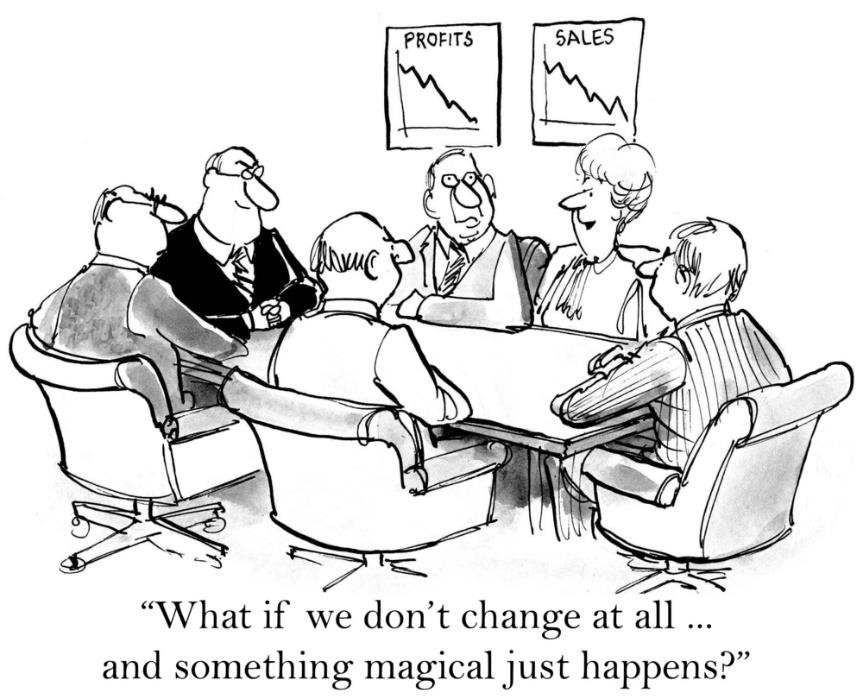By Brigitte Le Borgne
October 18th, 2018

The story is set in a rapidly growing French SME that just made 2 major acquisitions and plans to make 2 others in 2019. The company also plans to push forward these targets’ business model on the short term.
On the occasion of a take-notes debate with the President, I pointed out:
- The considerable scale of the transformation they planned;
- The high number of projects being carried out simultaneously (other than acquisitions), the dispersion of efforts and the increased workload it could cause the teams to face.
His answer was as follows: “You are right, but I am not the one taking care of the execution; my right hand man is.”
I am not the one taking care of the execution; my right-hand man is.
Two weeks later, this very COO would in turn explain, when discussing the change effort:
“We prepare the future by pooling some support departments, and we just announced this decision with immediate effect”
“Furthermore, to improve how well the Executive Committee works, we requested the help of a consultant for 3 days, we spoke quite frankly to one another, and now everything has been set right.”
Regarding the inventory of projects being currently carried out and the workload for key co-workers that the President and I had identified, he added that it had not been carried out, because “nobody had the time to do it”.
Does it seem plausible to you that, in this company, the execution of the strategy will match the President and shareholders’ expectations in the coming year?
A popular misconception amongst executives is that the execution remains part of tactics, and that, as such, it can be delegated.
The development of the company’s vision and the defining of a strategy – that must be simple, broadly communicated upon, and frequently reviewed – is of course the task of the executive management, in coordination with the Board of Directors. However, the execution of that strategy is just as vital for the company’s future: an execution that drifts off its course weighs down on the company’s development capability, jeopardizes its capacity to develop, and its sustainability. According to the executives themselves, failure to execute operationally reduces the strategy’s value creation by 40%.
Why is the execution of your strategy a prime responsability for the leader, and what does it consist in?
It is not about micro-management or removing managers’ responsibilities.
However, it is key that the leader sets up, from the start, a rigorous and transparent conversation with the teams, systematically questioning the ‘how‘ and ‘what‘ of a decision, rigourously follow its implementation, and makes sure its contributors are accountable for the result.
- In that respect, the implementation mechanism is an integral part of the company’s management system (similarly to the budgetary process, performance review, project governance, etc.) and even of its culture.
- In that regard, it becomes a tool that progressively allows a behavioral change of managers, thanks to the leader’s exemplary effect.
- It also allows coworkers to exert a pressure on the managers at the level above theirs, so that these managers would clarify overall priorities at their level, and then open a dialogue themselves.
- Lastly, it brings a global perspective of the company to business unit or division directors, which proves to be formative and to generate commitment towards the strategic project.
That said, in a report published by the Gallup Institute early 2018, only 6% of French workers feel committed (in other words, enthusiastic about their work and attached to their company) while the average in Western Europe is 10%.
The institute also valued (all countries combined) the impact of commitment on financial performance, between the quartile with the highest performing companies, and those with the lowest commitment rate, at 21% reduced profitability.
The seven characteristics of an excellent leader at work

- The leader knows all the company’s key executives, even if they do not report to him directly, and strives to develop a personal relation with each of them. The leader spends a considerable part of their time recruiting them and working towards their skill improvement.
- The transparent dialogue established with the teams allows the leader to understand in detail the reality of operations. They now evaluate the company’s performance, not just compared to the previous year, but also and mostly compared to their competitive environment. Similarly, the economy approach that they naturally carry out allows them to continuously update the strategy.
- The leader who pilots the execution of the strategy focuses on a few clear priorities, in which each coworker can easily find their own place.
- They rigorously and systematically track and review what steps and actions have been taken, and ensure that each coworker kept their promises. For this purpose, the leader does not hesitate to make conflicts emerge, should they compromise the expected results.
- The leader evaluates and rewards co-workers based on their results, while considering the conditions in which those were achieved or not. The leader gives greater responsability to those that, like him, focus on execution.
- The leader observes the behavior and performance of their teams, and provides them feedback on the positive, but also on what needs to change. The leader recognizes that high performers with inappropriate behavior end up having a negative influence on the company’s results, and that it should get rid of them quickly enough.
- Finally, this leader encourages points of view different to their own and deals with situation of conflict or underperformance with courage. This trait of character allows them to grasp all the ambiguity within a rapidly evolving organization, within a volatile, uncertain, complex and unclear ecosystem.
In the light of the leadership characteristics we just exposed, how has evolved your opinion on the aforementioned SME’s ability to execute its strategy?
References and definitions
***
- Execution, the discipline of getting things done, Larry Bossidy & Ram Charan, Currency New-York, 278 p.

Leave A Comment
You must be logged in to post a comment.